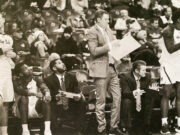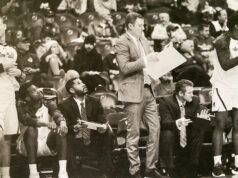By Paige Dunn
Ask an athlete what percentage of their athletic performance is mental. Then ask them what percentage of their time they dedicate to improving the mental component of their athletic life. For some, the discrepancy is huge and many athletes are neglecting the mental aspect of their sport. The work of Sport Psychology Consultants is helping to change this and much of their work is based on the concept that being a well-rounded and successful athlete means being an athlete who is physically, mentally and emotionally strong. Many people are beginning to realize that successful, rewarding athletic performance is based on more than merely physical talent – that it is equally dependent upon mental strength.Many people are still learning about the field of sport psychology. When athletes hear about Sport Psychology Consultants they often wonder “what do they actually do?” and “why would I need or want to work with one?”. To answer those questions it is important to clarify what sport psychology professionals are out doing there in the field. In a nutshell, Sport Psychology Consultants educate, counsel and support athletes in order to improve the athlete’s performance. Ultimately the Sport Psychology Consultant’s role is to assist an athlete in helping themselves become a better athlete. Sport Psychology involves extending theory and research into the field to educate coaches, athletes, and parents with the goals of facilitating optimal sport involvement and performance.
The work between the athlete and Sport Psychology Consultant is a combination of an educational component and a counseling component. Improving performance is a Sport Psychology Consultant’s number one goal. A Sport Psychology Consultant will assess an athlete’s current performance and evaluate goals and goal strategies to determine the best method for the athlete to improve their performance. The mental techniques that a Sport Psychology Consultant introduces are in the areas of goal setting, motivation, confidence, relaxation, focus & concentration, team cohesion and communication.
In order for any of the techniques that a Sport Psychology consultant introduces to work, the Sport Psychology Consultant must really evaluate what is going on with the athlete emotionally and mentally to ensure that the use of mental training techniques will be effective. Sport Psychology Consultants counsel athletes with regard to their personal and professional life and then use appropriate mental techniques to help an athlete enhance their performance. This is the major difference between a coach teaching sport psychology skills and a Sport Psychology Consultant teaching the skills. While a coach may know his or her athlete well, he may not have the proper educational background to explore the psychological foundation of the athlete. A Sport Psychology Consultant is trained to evaluate and understand what is going on in an athlete’s personal or professional life that may take away or add to their athletic performance. Having the expertise to identify what method or technique will best fit an athlete based on where they are at mentally and emotionally is the job of a trained Sport Psychology professional.
Helping athletes deal with the pressure associated with competition is another reason a Sport Psychology Consultant might work with an athlete. Every athlete deals with pressure in a different way. Whether the pressure is coming from coaches, parents or the athlete themselves, for some athletes, the pressure is debilitating. Sport Psychology Consultants are trained to help athletes understand how pressure affects them and what strategies might work to help them overcome the debilitating effects of pressure.
Many ask what type of athlete needs to or chooses to work with a Sport Psychology Consultant. The simple answer to this question is any athlete who wishes to improve his or her performance. Any athlete regardless of age, gender and skill level can benefit from working with a Sport Psychology Consultant. Some athletes assume that they have to be at an elite level to work with a Sport Psychology Consultant. This is entirely untrue. In fact, many recreational athletes who are making their sport an important part of their life are benefiting from working with a Sport Psychology Consultant. The most important thing is that an athlete needs to be open to working with a Consultant and motivated to incorporate the information and skills that are delivered by the Sport Psychology Consultant.
Finding a qualified Sport Psychology Consultant is not as hard as some may think. Ask around. You may be surprised to learn that many athletes in your area are working, or have worked, with a Sport Psychology Consultant. The best way to find a referral is to ask a source in your own network. Searching on the Internet is also an effective method. Many Sport Psychology Consultants have Web sites that introduce their practice and will provide information about their services and experience. Be sure to explore a Sport Psychology Consultant’s specialty and qualifications. Many focus on a specific type of athlete such as endurance athletes or team sports. Additionally, on the Internet be sure to check out the Association for the Advancement of Applied Sport Psychology’s (AAASP) Web site (www.aaasponline.org). This Web site will provide a list of consultant’s who are certified by this organization.
If performing at their best is an athlete’s goal, working with a Sport Psychology Consultant will help them leverage their mental strengths and take them to the next level. Athletes of all levels and abilities are discovering that working with a Sport Psychology Consultant can help an athlete achieve and maintain mental toughness and emotional stability with regard to their sport.
Paige Dunn is a Sport Psychology Consultant who works with athletes through her private practice, Xcel Sports Psychology Group (www.xcelsportsgroup). She can be reached at paige@xcelsportsgoup.com.













